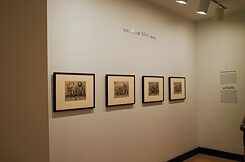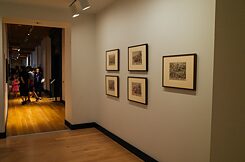The Walter Trier Gallery
German Traces in Toronto
The Walter Trier Gallery
The Art Gallery of Ontario, with its collection of more than 80,000 works, is one of the largest art museums in North America, and tucked away in the Prints and Drawings section on the first floor is the Walter Trier Gallery.
 The Walter Trier Gallery
| © Goethe-Institut Montreal
Walter Trier was born in 1890 to German-Jewish parents in Prague, which was then part of the Austro-Hungarian Empire. After studying art in Prague and Munich, he moved to Berlin at age 20, where he worked as an illustrator. Trier’s illustrations were published in popular German art and satire magazines of the time, such as “Jugend” (the namesake of “Jugendstil”, German Art Nouveau) and “Simplicissimus”. He became the regular press illustrator of the Berlin-based satirical magazine “Lustige Blätter”, and within 10 years had over 1000 full-page colour drawings published, becoming one of the most successful illustrators in Berlin.
The Walter Trier Gallery
| © Goethe-Institut Montreal
Walter Trier was born in 1890 to German-Jewish parents in Prague, which was then part of the Austro-Hungarian Empire. After studying art in Prague and Munich, he moved to Berlin at age 20, where he worked as an illustrator. Trier’s illustrations were published in popular German art and satire magazines of the time, such as “Jugend” (the namesake of “Jugendstil”, German Art Nouveau) and “Simplicissimus”. He became the regular press illustrator of the Berlin-based satirical magazine “Lustige Blätter”, and within 10 years had over 1000 full-page colour drawings published, becoming one of the most successful illustrators in Berlin.
In 1929, Trier was introduced to a young Erich Kästner, a journalist looking to publish his first children’s book. Trier illustrated the book, “Emil und die Detektive” (“Emil and the Detectives”), which became an instant hit and remains a classic of children’s literature. Trier and Kästner’s working relationship lasted 25 years and resulted in over a dozen works, including most of Kästner’s best-known works, such as “Das fliegende Klassenzimmer” (“The Flying Classroom”) and “Das doppelte Lottchen” (“Lottie and Lisa”, which was the inspiration for the movie “The Parent Trap”).
 Drawings by Walter Trier
| © Goethe-Institut Montreal
Life changed for Trier when Hitler was elected chancellor in 1933. Not only was Trier of Jewish descent, but he was also anti-fascist and known for his political satire. He moved to England with his family in 1936, where he was able to continue working. Among other things, he began illustrating the covers for the monthly humour magazine “Lilliput” from its founding in 1937. He kept up this collaboration for 12 years, totaling almost 150 covers. All of the covers featured the same couple and their dog in a variety of fanciful situations. Trier also continued drawing political caricatures and satire during World War II, including illustrating anti-fascist pamphlets for the British Ministry of Information.
Drawings by Walter Trier
| © Goethe-Institut Montreal
Life changed for Trier when Hitler was elected chancellor in 1933. Not only was Trier of Jewish descent, but he was also anti-fascist and known for his political satire. He moved to England with his family in 1936, where he was able to continue working. Among other things, he began illustrating the covers for the monthly humour magazine “Lilliput” from its founding in 1937. He kept up this collaboration for 12 years, totaling almost 150 covers. All of the covers featured the same couple and their dog in a variety of fanciful situations. Trier also continued drawing political caricatures and satire during World War II, including illustrating anti-fascist pamphlets for the British Ministry of Information.
Trier and his wife immigrated to Ontario in 1947 to be closer to their daughter. He continued his career as an illustrator in Canada, where he designed advertisements and contributed to exhibitions at the Art Gallery of Ontario and the University of Toronto until his unexpected death in 1951. The AGO's Walter Trier Gallery is devoted to his work and to satirical illustrations by other artists. It was supported by a gift from the Trier-Fodor Foundation of over 1100 pieces by Trier.
Art Gallery of Ontario
317 Dundas St W
Toronto, ON M5T 1G4
WDR-Feature on Walter Trier